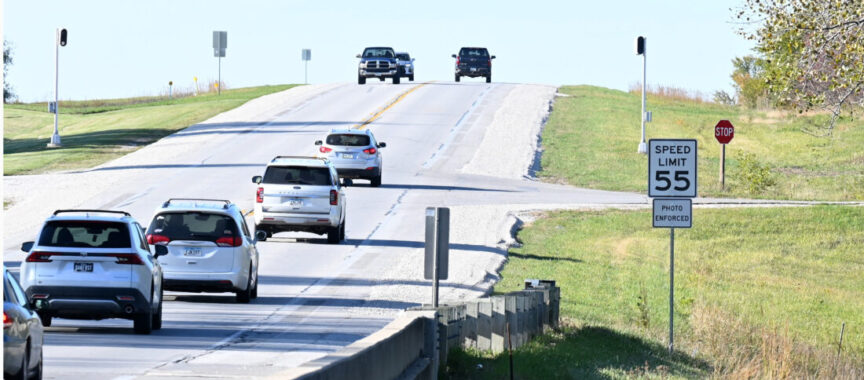The City of Webster City has filed a lawsuit against the Iowa Department of Transportation, alleging its order to suspend use of the city’s speed cameras is unlawful.
Specifically, it alleges the DOT misread the new law, ignored the city’s rationale for operating the speed cameras, and applied the wrong standard to its review of the city’s submission.
Finally, and perhaps most importantly, the lawsuit claims suspending operation of the cameras will allow dangerous levels of speeding in, and near, Webster City to go unchecked.
Webster City applied to the Iowa Department of Transportation for permits to operate speed cameras at four locations on May 19, 2023, receiving permission to proceed on September 7, 2023. The cameras monitored the speed of traffic both east and westbound on U.S. Highway 20 at milepost 140 (near the Webster City exit), and on Iowa Highway 17, both north and southbound, at Millards Lane, about a mile south of U.S. 20.
On May 17, 2024, Iowa Gov. Kim Reynolds signed House File 2681 into law, requiring local authorities to apply for permits to operate speed cameras.
Webster City shut down its four speed cameras in late May 2024 in anticipation of House File 2681 becoming law.
Complying with provisions of the new law, Webster City filed for a permit to begin using the cameras again, on June 30, 2024.
Accompanying the city’s permit request were a series of records, including: Iowa DOT crash data from 2023 and 2024, the number of citations arising from each camera in 2023 and 2024, records detailing the number and severity of collisions and accidents at each location, and an explanation as to why use of a speed cameras was “appropriate and necessary.”
Webster City Chief of Police Shiloh Mork received a letter from the DOT on September 30 advising it found operation of the Webster City cameras was “not necessary.”
No further rationale, beyond those two words, was provided. Accordingly, the city was directed to “cease using all systems at these locations until it obtains a permit to operate a system at these locations from the Iowa DOT.”
Other Iowa counties and cities shut down their speed cameras at the same time, including Buffalo, Charles City, Chester, Hudson, Hazleton, Fredericksburg, Fayette, Independence, LaPorte City, Lee County, Maynard, Oelwein, Postville, Prairie City, Strawberry Point, Tama and West Union. It’s not immediately known if any of these municipalities are filing lawsuits.
The September DOT letter further informed Webster City: “(it) may choose to reapply for a permit at a later date. However, since the City is not being issued a permit at this time, the earliest the Iowa DOT could issue a permit for any new locations, or for previously denied locations, is July 1, 2026.”
The city’s case is based on its belief the DOT’s decision is “unlawful, arbitrary and capricious,” and “irreparably harms Webster City, its residents, and the motoring public …”
In the filing, the city’s attorneys wrote, “the City discovered the cameras reduced speeding on a consistent basis, allowed for traffic enforcement in all weather conditions, reduced potentially dangerous traffic stops, and enabled the City to use its small police department for other law enforcement priorities.”
Data collected from the cameras verify hundreds of motorists speed through Webster City each month, often exceeding published speed limits by 30, 35 or 40 miles per hour. A few were clocked at 100 mph, or even higher.
Despite its best efforts, the Webster City Police Department can’t hope to enforce speed limits against such a large number of potential violations. This is where the speed cameras, on the job 24 hours a day, make a big difference.
Webster City leases the speed cameras from Sensys Gatso, a Swedish-owned company with a U.S. office in Massachusetts. According to the company’s website, “Each day, more than 3,500 people die, (worldwide) not from sickness or old age, but from traffic crashes. We cannot accept this. This is why we embrace Vision Zero. A road safety vision that is about eliminating all traffic fatalities and severe injuries, while ensuring safe and sustainable mobility for all.”
Vision Zero, which originated in Sweden in the 1990s, has been adopted as policy by more than 50 cities across the USA, including: Minneapolis-St. Paul, Chicago, Madison, Wisconsin; Ann Arbor, Michigan; and Columbus, Ohio, in the Midwest. North Carolina has aggressively pursued a policy of reducing highway fatalities, calling for a “change of the culture” to encourage drivers to adopt safer practices. Chief among these, is driving at lower speeds and pledging not to use cell phones while in a motor vehicle.
View this article as it originally appeared in the Daily Freeman-Journal.
Last modified: November 18, 2024

